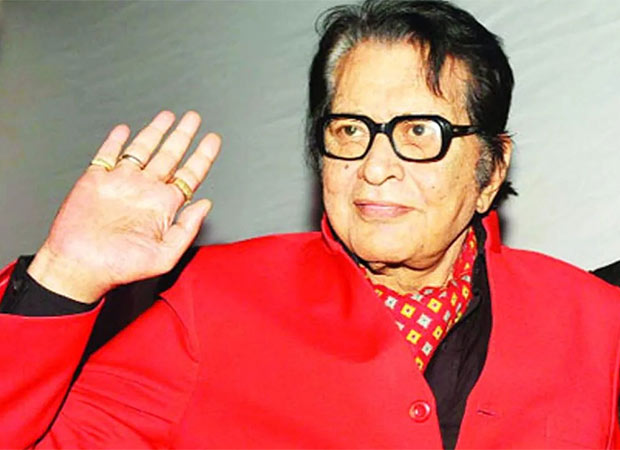Manoj Kumar had seen the horrors of Partition at first-hand, and that was the driving emotion that helped him fashion the patriotic masterpiece that was Shaheed (1965) with a gift that long lay dormant within him—scriptwriting. At the special screening of this Bhagat Singh biopic for the then-Prime Minister, Lal Bahadur Shastri in New Delhi, the latter implored him to make a movie on his famous slogan, “ Jai Jawaan Jai Kisan ”. As the Dadasaheb Phalke laureate told me, “I came back to Mumbai in the Frontier Mail.
And in the 24-hour travel time, I wrote the entire script of Upkar , which I decided to direct myself. Friends discouraged me and said, ‘Everyone can’t be Raj Kapoor. You are doing fine as a hero!’ But I took the plunge!” Said Manoj, “Sadly, Shastri- ji never lived to watch the film, which won the President’s Gold Medal, which was what the National award for Best Film was called then.

” With these two films, Manoj Kumar was rechristened by the film industry and even viewers as “Mr. Bharat”. The film Upkar became 1967’s biggest blockbuster and its Kalyanji-Anandji-composed ‘ Mere desh ki dharti ’ is still untouched as a celebration of India as a nation.
Manoj’s subsequent films, Purab Aur Pacchim, Roti Kapada Aur Makaan and Kranti followed the patriotic leitmotif, but he took a short break to deliver an emotional father-son tour de force , Shor in 1972, which many consider as his finest directorial. Manoj was just nine when his family was uprooted by Partition from his Punjab village named Jandyala Sher Khan, now in Pakistan. He saw terrible bloodshed and the family put up for two long years at the Kingsway Refugee Camp on the outskirts of Delhi.
“Every morning, I had to trudge two kilometers to get milk, and another two in the opposite direction to get bread!” he told me. “Anything emotional or touching in my scripts was exclusively born from these experiences. My approach to characterization is a by-product of these memories.
I missed schooling for two years. By the time I resumed school in Delhi, my fondness for films had been established.” But it was not so simple.
The shy Manoj was afraid of his father. One day, his father told him, “I have been getting these letters from Lekhraj. Do you want to become an actor?” And on October 9, 1956, Manoj left for Mumbai.
For a man who had started out with a cameo as a mendicant, his karmic connection with deshbhakti had come with this first-ever screen appearance, singing the patriotic song, ‘ Maati ko lajaana na ’ in Bhakri’s Fashion . After this, Manoj acted in Homi Sethna’s documentary Gangu Teli in the title-role and did a few scenes in Bhakri’s Sahara, Chand and Panchayat . Bhakri was to give him lead roles only later in Maa Beta and Banarasi Thug.
But it was Rajendra Kumar who recommended Manoj to H.S. Rawail, for his first lead role, Kanch Ki Gudiya , opposite Sayeeda Khan.
The film flopped, but the fact that he had been signed by the leading filmmaker got him six assignments, including Reshmi Rumal directed by Ashok Bhatt. Said Manoj, “Ashok’s uncle, the famous Vijay Bhatt, was often called on the sets for advice. And he signed me for Hariyali Aur Rasta , my first jubilee, opposite Mala Sinha.
” But while Sippy and Raj Khosla were big names, Sadhana had faced some flops and when director Raj Khosla suggested her name, Manoj said, “Why not take her? Two negatives might make a positive!”. Woh Kaun Thi? proved a whopper hit, but early during the making of the film, Manoj rewrote many scenes and showed his work to Khosla. He ended up rewriting the dialogues for most of the film.
On a parallel track, Manoj had already penned a script on Bhagat Singh. “Not many are aware that I would professionally ghost-write three or four scenes every week for different films and was paid Rs 11 per scene!” the actor recalled. “And Bhagat Singh was my dream character.
My secretary and friend Kewal P. Kashyap was keen on turning producer and he read my script and was adamant that he would make it!” Shaheed (1965) was an instant hit, and was appreciated by critics. “At a particular point in the film, the director was at a loss how to proceed.
I took over and shot a few scenes. And that’s when I realized, ‘This is it! Direction is the ultimate creative area, the real job!’” said Manoj. By that time, Manoj had acted in multiple successful films like Ghar Basake Dekho, Apne Huye Paraye, Himalay Ki God Mein, Sawan Ki Ghata, Do Badan and Gumnaam .
With more hits like Patthar Ke Sanam, Neel Kamal, Sajan, Yaadgar, Pehchan, Beimaan , Sanyasi and Dus Numbri , Mr. Bharat acquired a new tag: of a Midas who could do no wrong. But times had changed, and after a last fleeting appearance in Maidan-E-Jung (1995), he never came on screen.
Technically, his last success was as a lyricist in Lootere (1993), which saw him pen the title song and the popular ‘ Mujhe le chal mandir ’. His last work too was as songwriter for the Sai Baba film, Maalik Ek (2010) with music by Anup Jalota, who he had introduced as singer and composer in Shirdi Ke Sai Baba . Manoj Kumar was Columbus also to Meenakshi Seshadri, lyricists Santosh Anand and Rajkavi Inderjit Singh Tulsi and composers Uttam Singh-Jagdish Khanna, besides insisting on favourite singer Mukesh’s son Nitin Mukesh as a singer, with Laxmikant-Pyarelal’s tacit approval, in Kranti .
Manoj’s firm credos as a filmmaker held him in good stead. “I was influenced by Guru Dutt’s way of filming songs. At one point in a film, my script stops, and a song conveys much more in a few minutes before I go back to it!” he told me.
“And as a director, I am ruthless with what I have written—in the interest of the film. Then, when I sit on the edit (Manoj became film editor with Shor ), I am ruthless with the footage the director has shot, again in the interest of my film!” Also Read: RIP Manoj Kumar: Waheeda Rehman, Shatrughan Sinha and others from the industry fondly remember ‘Bharat’: “He became a symbol of hope for every young Indian” BOLLYWOOD NEWS - LIVE UPDATES Catch us for latest Bollywood News , New Bollywood Movies update, Box office collection , New Movies Release , Bollywood News Hindi , Entertainment News , Bollywood Live News Today & Upcoming Movies 2025 and stay updated with latest hindi movies only on Bollywood Hungama..
The journey of Manoj Kumar: From staying in a refugee camp to being a celebrated legend

Manoj Kumar had seen the horrors of Partition at first-hand, and that was the driving emotion that helped him fashion the patriotic masterpiece that was Shaheed (1965) with a gift that long lay dormant within him—scriptwriting. At the special screening of this Bhagat Singh biopic for the then-Prime Minister, Lal Bahadur Shastri in New Delhi, the latter implored him to make a movie on his famous slogan, “Jai Jawaan Jai Kisan”.As the Dadasaheb Phalke laureate told me, “I came back to Mumbai in the Frontier Mail. And in the 24-hour travel time, I wrote the entire script of Upkar, which I decided to direct myself. Friends discouraged me and said, ‘Everyone can’t be Raj Kapoor. You are doing fine as a hero!’ But I took the plunge!”Said Manoj, “Sadly, Shastri-ji never lived to watch the film, which won the President’s Gold Medal, which was what the National award for Best Film was called then.”With these two films, Manoj Kumar was rechristened by the film industry and even viewers as “Mr. Bharat”. The film Upkar became 1967’s biggest blockbuster and its Kalyanji-Anandji-composed ‘Mere desh ki dharti’ is still untouched as a celebration of India as a nation.Manoj’s subsequent films, Purab Aur Pacchim, Roti Kapada Aur Makaan and Kranti followed the patriotic leitmotif, but he took a short break to deliver an emotional father-son tour de force, Shor in 1972, which many consider as his finest directorial.Manoj was just nine when his family was uprooted by Partition from his Punjab village named Jandyala Sher Khan, now in Pakistan. He saw terrible bloodshed and the family put up for two long years at the Kingsway Refugee Camp on the outskirts of Delhi. “Every morning, I had to trudge two kilometers to get milk, and another two in the opposite direction to get bread!” he told me. “Anything emotional or touching in my scripts was exclusively born from these experiences. My approach to characterization is a by-product of these memories. I missed schooling for two years. By the time I resumed school in Delhi, my fondness for films had been established.”Manoj Kumar’s cousin, Lekhraj Bhakri, was making films. “It’s strange how these dates get linked to me, but on January 26, 1956, he had come to Delhi for the premiere of his film Tangewali starring Shammi Kapoor!” smiled Manoj. “I was 18 and he told me, “Arre yaar, tum to bilkul hero lagte ho!” and I replied, “To banaa dijiye!”But it was not so simple. The shy Manoj was afraid of his father. One day, his father told him, “I have been getting these letters from Lekhraj. Do you want to become an actor?” And on October 9, 1956, Manoj left for Mumbai.For a man who had started out with a cameo as a mendicant, his karmic connection with deshbhakti had come with this first-ever screen appearance, singing the patriotic song, ‘Maati ko lajaana na’ in Bhakri’s Fashion. After this, Manoj acted in Homi Sethna’s documentary Gangu Teli in the title-role and did a few scenes in Bhakri’s Sahara, Chand and Panchayat. Bhakri was to give him lead roles only later in Maa Beta and Banarasi Thug.But it was Rajendra Kumar who recommended Manoj to H.S. Rawail, for his first lead role, Kanch Ki Gudiya, opposite Sayeeda Khan. The film flopped, but the fact that he had been signed by the leading filmmaker got him six assignments, including Reshmi Rumal directed by Ashok Bhatt. Said Manoj, “Ashok’s uncle, the famous Vijay Bhatt, was often called on the sets for advice. And he signed me for Hariyali Aur Rasta, my first jubilee, opposite Mala Sinha.”Manoj then made a crucial decision: that despite needing work and money, he would first check the setup before accepting any film. “So, I accepted S.S. Vasan’s Grihasti but rejected N.N. Sippy’s Woh Kaun Thi?,” recalled the actor. “I was married and about eight months later, my son Vishal was born. Nari Sippy actually came to the maternity hospital and said, ‘Look, you have now got a son. You need the money. Accept my film, and we will do the setup together.’”But while Sippy and Raj Khosla were big names, Sadhana had faced some flops and when director Raj Khosla suggested her name, Manoj said, “Why not take her? Two negatives might make a positive!”.Woh Kaun Thi? proved a whopper hit, but early during the making of the film, Manoj rewrote many scenes and showed his work to Khosla. He ended up rewriting the dialogues for most of the film.On a parallel track, Manoj had already penned a script on Bhagat Singh. “Not many are aware that I would professionally ghost-write three or four scenes every week for different films and was paid Rs 11 per scene!” the actor recalled. “And Bhagat Singh was my dream character. My secretary and friend Kewal P. Kashyap was keen on turning producer and he read my script and was adamant that he would make it!”Shaheed (1965) was an instant hit, and was appreciated by critics. “At a particular point in the film, the director was at a loss how to proceed. I took over and shot a few scenes. And that’s when I realized, ‘This is it! Direction is the ultimate creative area, the real job!’” said Manoj.By that time, Manoj had acted in multiple successful films like Ghar Basake Dekho, Apne Huye Paraye, Himalay Ki God Mein, Sawan Ki Ghata, Do Badan and Gumnaam. With more hits like Patthar Ke Sanam, Neel Kamal, Sajan, Yaadgar, Pehchan, Beimaan, Sanyasi and Dus Numbri, Mr. Bharat acquired a new tag: of a Midas who could do no wrong.A Sai Baba devotee, he then wrote, presented, starred in and made his debut as lyricist with Shirdi Ke Sai Baba. In the 1980s, he introduced son Kunal Goswami as a child artiste in Kranti and later as leading man in Jai Hind: The Pride (his last production and directorial) and attempted to launch son Vishal as singer in Ricky and brother Rajeev Goswami as a hero in Painter Babu.But times had changed, and after a last fleeting appearance in Maidan-E-Jung (1995), he never came on screen. Technically, his last success was as a lyricist in Lootere (1993), which saw him pen the title song and the popular ‘Mujhe le chal mandir’. His last work too was as songwriter for the Sai Baba film, Maalik Ek (2010) with music by Anup Jalota, who he had introduced as singer and composer in Shirdi Ke Sai Baba.Manoj Kumar was Columbus also to Meenakshi Seshadri, lyricists Santosh Anand and Rajkavi Inderjit Singh Tulsi and composers Uttam Singh-Jagdish Khanna, besides insisting on favourite singer Mukesh’s son Nitin Mukesh as a singer, with Laxmikant-Pyarelal’s tacit approval, in Kranti.Manoj’s firm credos as a filmmaker held him in good stead. “I was influenced by Guru Dutt’s way of filming songs. At one point in a film, my script stops, and a song conveys much more in a few minutes before I go back to it!” he told me. “And as a director, I am ruthless with what I have written—in the interest of the film. Then, when I sit on the edit (Manoj became film editor with Shor), I am ruthless with the footage the director has shot, again in the interest of my film!”Also Read: RIP Manoj Kumar: Waheeda Rehman, Shatrughan Sinha and others from the industry fondly remember ‘Bharat’: “He became a symbol of hope for every young Indian”














